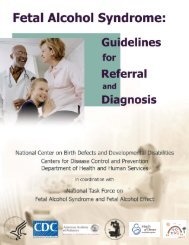FETAL ALCOHOL SPECTRUM DISORDERS florida resource guide
FETAL ALCOHOL SPECTRUM DISORDERS florida resource guide
FETAL ALCOHOL SPECTRUM DISORDERS florida resource guide
- No tags were found...
You also want an ePaper? Increase the reach of your titles
YUMPU automatically turns print PDFs into web optimized ePapers that Google loves.
Effects and Interventions for Infants and ToddlersIn general, children with FAS often display sensory processingdisorders. They can range from mild to quite severe and are a result ofthe damaging effects of alcohol on the developing nervous systemduring pregnancy. These neuropsychological effects can be presentthroughout the child’s life and cause significant problems in alldomains of development. Cognitive and language delays are oftenapparent. Behavioral problems are also frequently a result of sensoryprocessing dysfunction. Regulatory problems are seen very early ininfancy due to the inability of the nervous system to screen outincoming stimuli and to modulate it. As a result, these babies are oftenvery difficult to care for, and may cry inconsolably and have difficultyfeeding. Children with FAS who experience nurturing and responsivecaregiving environments, who are identified early, and receiveappropriate sensory integration therapy and relationship-basedintervention can be helped to learn self regulation and adaptiveresponses. The residual effects of FAS can be greatly reduced and thedevelopmental outcome greatly improved with early identification andtreatment, especially occupational therapy and speech therapy.As a child with FASD matures, the effects of prenatal alcohol exposurepresent new challenges and opportunities for interventions. A spectrumof difficulties appears throughout the live of an individual with FASD,but there are some commonly seen problems and effective ways ofdealing with them at different stages of development. Tactile andauditory defensiveness and the resulting negative responses by thechild can be misinterpreted as acting out or bad behavior.Understanding the underlying problems, treating the sensoryprocessing difficulties, and modifying the environment are criticalcomponents of effectively dealing with children with FAS at all agesand stages of development.Infants with FAS may display jitteriness, seizures, tremors, weak suck,unpredictable and disrupted sleep/wake cycles, poor state regulation,decreased vigorous bodily activity, low hearing threshold, failure tothrive, poor ability to filter out stimulus, or hyperextension of thebody with arched back.For the caregiver of an infant with FASD the following earlyintervention strategies will help to ease the baby’s fragile sensory systeminto the world:▪ Protect the baby from being overwhelmed by stimuli.▪ Be vigilante for cues that the baby is overstimulated (i.e., lookingaway or hiccupping).SECTION 5Effects of PrenatalAlcohol Exposure andIntervention StrategiesThe cornerstoneof interventionwith alcohol-exposedinfants is discoveringtheir tolerance forinteractions”— Harwood &Kleinfeld, 2002Part C is a federalentitlement programfor children agebirth to three with asuspected delay ordisability to receivescreening,evaluation, andservices neededregardless of income.Contact Children’sMedical Services(www.cms-kids.com/ContactUs/CMScontacts.pdf) formore information.<strong>FETAL</strong> <strong>ALCOHOL</strong> <strong>SPECTRUM</strong> <strong>DISORDERS</strong> <strong>florida</strong> <strong>resource</strong> <strong>guide</strong> 37



